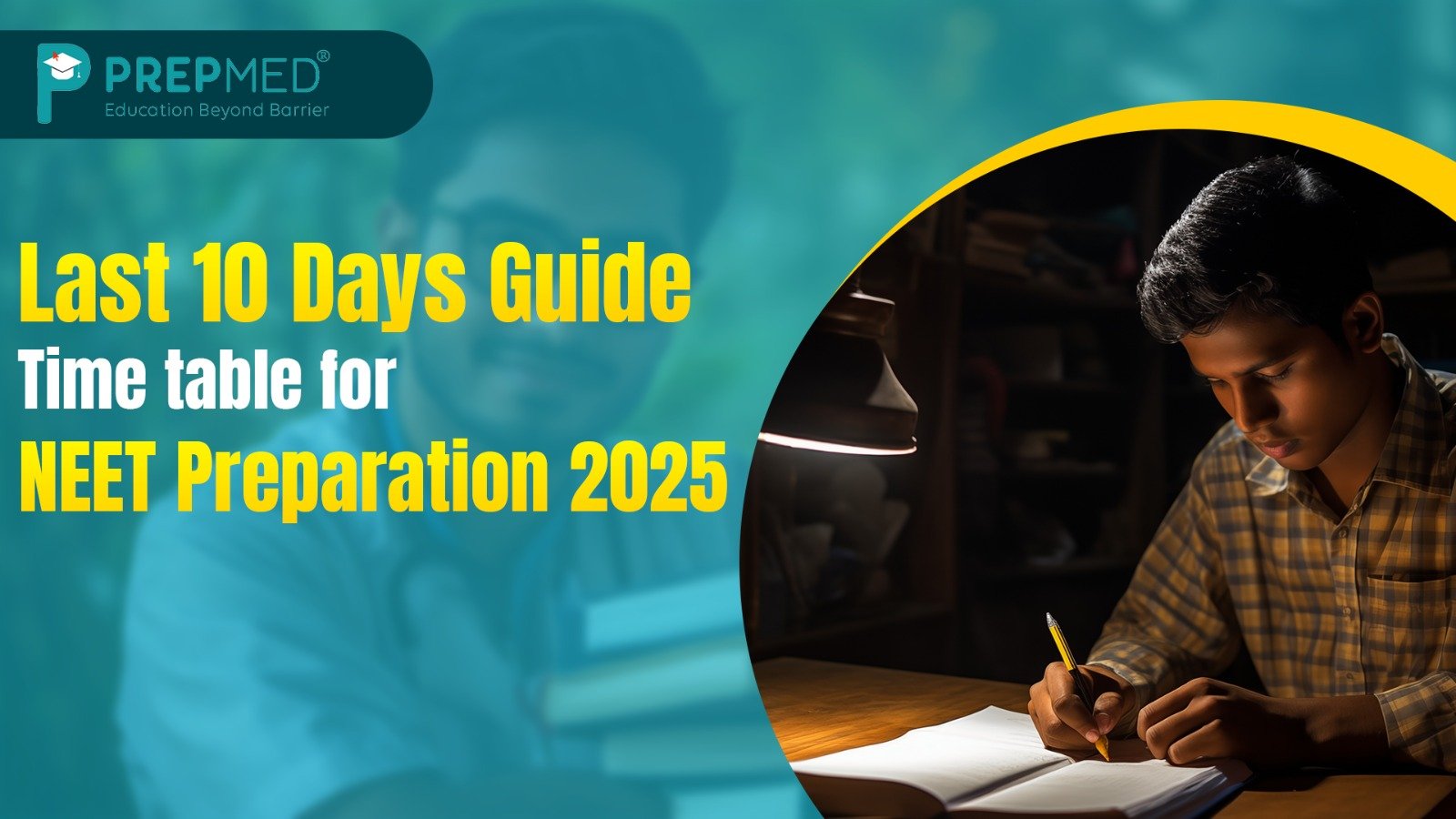April 24, 2025
Last 10 Days Guide: Time Table for NEET Preparation 2025
NEET 2025 Exam date approaches rapidly as students are now in their final 10 days before the exam. The competition has many participants. Students across the board share similar levels of anxiety, yet they can still optimise their study and confidence-building efforts during these final ten days.
The main focus should not be on learning everything from scratch. The strategy involves smart testing and strategic revision alongside mental calmness. In this guide, we’ll walk you through the most effective timetable for NEET preparation, packed with tips, daily plans, and proven strategies.
Fill up this form here to get a FREE expert guidance call from us:
Key Principles of an Effective Last 10-Day Study Plan for NEET
The current period does not provide an appropriate moment to delve into uncharted subject matter. Exhaustion and confidence loss will be the only results from this approach.
- The National Council of Educational Research and Training serves as your essential study material, particularly in Biology and Inorganic Chemistry.
- Mock tests act as your primary study tools because they develop your ability to solve problems in real-time.
- Physical and mental wellness remains your top priority because sleep, eating well and breathing correctly should never be sacrificed at this moment.
The signs of burnout become difficult to detect during the last stages of your journey. You need to revise with intelligence while testing with strategy and resting with direction.
The Best Time Table for NEET Aspirants (10-Day Plan)
Let’s break the remaining days into manageable, focused sessions so you don’t get overwhelmed.
Day 1-3: Rapid Subject-Wise Revision
Your goal should be to revisit all the high-weightage topics using short notes, summaries, and mind maps.
Biology:
- Revise the NCERT line-by-line.
- Focus on diagrams, definitions, and tables.
- High-yield chapters: Human Physiology, Genetics, Ecology, Plant Physiology.
Chemistry:
- Physical: Go over formulas and short tricks.
- Organic: Prioritise named reactions and mechanisms.
- Inorganic: NCERT tables, chemical properties, and periodic trends.
Physics:
- Focus on numericals from high-weightage topics like Mechanics, Current Electricity, and Optics.
- Memorise key formulas using a dedicated formula sheet.
Study Schedule Suggestion:
- 3 hours of Biology
- 3 hours of Chemistry
- 3 hours of Physics
- 1-hour mock test analysis or error revision
This phase is like fine-tuning a musical instrument—you’re not learning a new song, just making sure it sounds perfect.
Day 4-6: Practice and Performance Analysis
Here’s where mock tests become crucial. Simulate the actual exam conditions—same time slot, full test, no breaks.
Daily Goals:
- Work on 1 full-length mock test.
- Post-test: Spend 2-3 hours reviewing every error.
- Keep a "Error Book" to record recurring errors and faulty ideas.
- Revisit those weak areas using concise revision notes.
Subject Focus:
- Don’t ignore your strong subjects—maintain them.
- Dedicate a bit more time to the areas where you’re lagging.
Pro Tip: Start using OMR sheets if you haven’t yet. Filling the bubbles correctly under pressure is a real skill.
Days 7-9: Mixed Practice and Last-Round Revisions
Now, the aim is not only revision but also application of what you’ve revised.
Mixed Practice Strategy:
- Pick 3–4 high-weightage chapters from each subject daily.
- Solve topic-wise MCQS for each, focusing on application.
- Keep your “error book” handy and reattempt those tricky questions.
Revision Techniques:
- Use flowcharts, flashcards, and sticky notes for quick revisions.
- Biology: Revise line-by-line NCERT plus diagrams and key terms.
- Chemistry: Revise periodic trends, key exceptions, and mechanisms.
- Physics: Re-solve formula-based numericals and conceptual MCQS.
Schedule for Each Day (Sample):
- 9 AM – 11 AM: Mixed MCQS (Bio + Chem)
- 11:30 AM – 1 PM: Revise Biology Notes
- 2 PM – 5:20 PM: Mock Test (Daily)
- 6 PM – 8 PM: Error analysis & topic brushing
- 8:30 PM – 10 PM: Review NCERT summaries
What to Avoid:
- Don’t cram. Instead, understand patterns.
- Avoid comparing scores or preparation with others—it only builds anxiety.
By now, your recall, accuracy, and confidence should all be peaking. If something feels shaky, revisit it. You still have time.
Day 10: Light Review & Mental Reset
This is the calm before the storm. Think of Day 10 as your warm-up round, not a race day.
What to Focus On:
- Revise formulas, diagrams, and exception cases.
- Go through the NCERT short notes and the underlined parts.
- Revisit tough MCQS from your error book, but don’t dive deep into heavy problem-solving.
Mental Preparation:
- Visualise exam day—calmly sitting, solving questions confidently.
- Do some breathing exercises or meditation.
- Take frequent breaks and avoid anything that spikes anxiety.
Physical Wellness Checklist:
- Eat light and healthy meals.
- Sleep by 10 PM to wake fresh for the next day.
- Avoid phone screens 1 hour before bed.
Remember, the real exam is a battle of composure as much as competence. A calm, confident mind performs way better than a stressed one.
Ideal Daily Time Table for NEET Preparation (Hour-by-Hour)
Want a foolproof plan for each day? Here’s an hour-wise breakdown that has worked wonders for NEET toppers.
Morning Routine
- 6:30 AM: Wake up, hydrate, and do light stretches
- 7:00 AM – 9:00 AM: Revise key concepts
- 9:00 AM – 9:30 AM: Light breakfast
- 9:30 AM – 11:30 AM: Practice subject-wise MCQS
Midday Study
- 12:00 PM – 1:00 PM: Revise NCERT chapters or short notes
- 1:00 PM – 1:30 PM: Lunch + Power Nap (15 mins)
- 2:00 PM – 5:20 PM: Complete mock tests
Evening Review
- 5:30 PM – 7:00 PM: Analyse test performance, solve incorrect ones
- 7:00 PM – 8:00 PM: Revise formulas or reaction mechanisms
- 8:00 PM – 9:00 PM: Dinner + relax
Night Wind-down
- 9:00 PM – 10:00 PM: Flashcard review + motivational podcast/video
- 10:00 PM: Sleep (Aim for 7+ hours minimum)
This time table combines strategic learning, repetition, and rest, which is key for top NEET performance.
Tips to Stay Consistent With Your NEET Study Plan
Consistency becomes extremely difficult to maintain when students experience increasing levels of pressure. Top scorers maintain their consistency in ways that separate them from other students.
The following steps will help you maintain consistency during these last ten days:
- Smaller goals work better than large tasks when you break them down into smaller units, such as “Revise 2 chapters today.”
- Set timers according to Pomodoro or 50–10 strategies, which involve 50 minutes of study followed by 10 minutes of rest.
- Daily progress tracking requires a wall planner or diary system to record completed tasks.
- The last ten days should be social media-free because they will not provide any useful information.
- The daily routine should remain unchanged regardless of mock score performance.
During these 10 days, your main habit needs to be discipline and focus because success depends on forming good habits.
Common Mistakes to Avoid During the Last 10 Days
Intelligent students often make mistakes during moments of high anxiety. The following mistakes need to be completely avoided:
- New chapter or concept learning will create confusion that damages your current abilities.
- A brain that lacks sleep and meals becomes unsteady and confused. Eat and rest well.
- Not analysing mock test results leads to the repetition of previous mistakes.
- The scores from mock tests should not affect your motivation because they serve as practice tools rather than evaluation instruments.
- Regular contact with friends or family members helps you rest and relax from your studies.
Remember that the final goal is approaching fast. Keep running forward without changing your shoes at this point.
Conclusion
Your dream of becoming a doctor is just 10 days and one exam away.
This final timetable for NEET preparation is designed not to overload you, but to sharpen your preparation, reduce stress, and give you the best possible chance of success.
So, stay disciplined, avoid distractions, revise smartly, and most importantly, believe in your journey.
If you’re looking to upgrade your NEET prep with more innovative tools, PrepMed is the go-to platform. With detailed error tracking and personalized study plans, it's built to help you master the final stretch.






